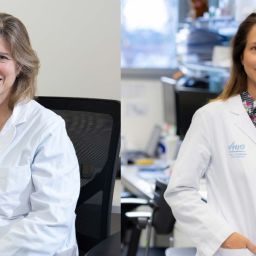
- An International Workgroup of Cancer Genetics Experts Convened by the American College of Medical Genetics and Genomics Develops Guidance on Clinical Management of CHEK2 Pathogenic Variants and Cancer Risks
- Dr. Judith Balmaña, VHIO’s Hereditary Cancer group leader, is one of the co-authors of this document that provides professionals with resources to provide a personalized approach to patient’s clinical management with CHECK 2 pathogenic variants predisposing to cancer.
An international workgroup of genetics and cancer experts convened by the American College of Medical Genetics and Genomics (ACMG) has published a highly anticipated and detailed clinical practice resource on CHEK2 pathogenic variants: “Management of Individuals with Germline Pathogenic/Likely Pathogenic Variants in CHEK2: a Clinical Practice Resource of the American College of Medical Genetics and Genomics.” A person with a pathogenic variant in the CHEK2 gene may be at an increased risk for developing breast and other cancers. This ACMG Clinical Practice Resource, published in ACMG’s flagship journal, Genetics in Medicine, provides valuable information for healthcare professionals caring for individuals with pathogenic variants in the CHEK2 gene.
ACMG President Susan Klugman, MD, FACMG, FACOG, said, “This is an important resource for this moderate risk cancer predisposition gene and discusses risk influencers including family history, specific variant and genetic and nongenetic factors. This resource will clearly have a worldwide impact for those taking care of cancer patients and patients who are predisposed to cancer because of their CHEK2 variant status.”
The new ACMG practice resource points out that while CHEK2 has largely been considered a “moderate risk” breast cancer gene, the distinction is blurred with risk being on a continuum, ranging from low to moderate to high risk. It states that the association of cancer risk with
CHEK2 variants is also complex and is influenced by several factors including the specific variant, family history, non-CHEK2 genetic background and other factors. Therefore, personalized (rather than generalized) risk must be assessed by a specialist in cancer genetics and take into account family and personal history, the specific variant(s) and other risk factors. Early cancer detection, surveillance, prevention, and clinical decisions should then be guided by these personalized risk estimates and shared decision making. Seeking consultation with a healthcare professional with expertise in cancer genetics and genetic counseling is recommended.
Lead author Helen Hanson, MD, said, “The association of CHEK2 with breast cancer predisposition has been recognized for many years, and a potential role for CHEK2 in predisposition of many other cancers has been described, but more difficult to establish. Coupled with the complexity of differing risk estimates depending on the population studied, genotype and the impact of modifying factors, it has proved challenging for clinicians to know how best to treat individuals with CHEK2 pathogenic or likely pathogenic variants in clinical practice. In developing this resource, we sought to make practical guidance based on current high-quality peer-reviewed evidence and input from an international team of specialists in cancer genetics to help guide clinical practice in this complex area.”
Senior author Douglas Stewart, MD, FACMG, described the difficulty of developing this comprehensive resource, “Clinically, pathogenic germline variants in CHEK2 are a major challenge for three main reasons: 1) the gene is featured on many cancer panels, so there is a large volume of testing done; 2) CHEK2 pathogenic variants are common in many populations; and 3) for many cancers, the degree of CHEK2-associated risk is uncertain or unknown. For this paper, we gathered an international team of experts and, informed by the latest literature, developed, we hope, a practical way forward to best help patients with pathogenic CHEK2.”
Dr Judith Balmaña, VHIO’s Hereditary Cancer group leader, has been one of the international experts conveyed by the ACMG to participate in this important resource related to clinical management of individuals with germline pathogenic/likely pathogenic variant in CHEK2. As a medical oncologist, she has been greatly involved in providing recommendations for the therapeutic options in individuals with cancer. “It is key to untangle the molecular mechanisms of tumorogenesis and response to oncologic treatments in order to select the most beneficial therapies for patients with a germline CHEK2 variant”, says Dr Balmaña
The international work group convened by the ACMG performed a comprehensive review of the evidence in peer-reviewed journals in order to guide clinicians in the surveillance, treatment and management of CHEK2 heterozygotes. The new ACMG Clinical Practice Resource also addresses knowledge gaps and needed future work.
About the American College of Medical Genetics and Genomics (ACMG) and ACMG Foundation
Founded in 1991, the American College of Medical Genetics and Genomics (ACMG) is a prominent authority in the field of medical genetics and genomics and the only nationally recognized medical professional organization solely dedicated to improving health through the practice of medical genetics and genomics. The only medical specialty society in the US that represents the full spectrum of medical genetics disciplines in a single organization, the ACMG provides education, resources and a voice for more than 2,600 clinical and laboratory practice of medical genetics as well as through advocacy, education and clinical research, and to guide the safe and effective integration of genetics and genomics into all of medicine and healthcare, resulting in improved personal and public health. Genetics in Medicine and the new Genetics in Medicine Open, a gold open access journal, are the official ACMG journals. ACMG’s website offers resources including policy statements, practice guidelines, and educational programs. The ACMG Foundation for Genetic and Genomic Medicine works to advance ACMG educational and public health programs through charitable gifts from corporations, foundations and individuals.
References



















